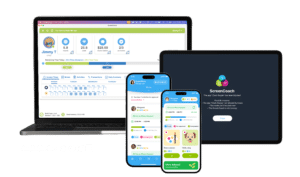
We have heard of screen obsession and addiction, the struggle to put down the device is incredibly challenging. Dopamine plays a huge rule in that, here’s why.
Why are screens so engaging and why are kids so bored when they get off? We all know the scenario – put the iPad and PlayStation or Xbox away for a weekend and the kids are restless, bored, and continually annoy their parents to give the screens back. Many parents have stopped bothering because it’s all too hard to get them off screens for any length of time.
There is a chemical reason for this, and it closely resembles the withdrawal symptoms experienced by drug users, albeit in a milder form. The neurotransmitter called Dopamine plays a significant part in this.
Dopamine is a chemical released in our brain whenever we are rewarded from doing an activity, and it is also released in anticipation of a reward. It makes us feel good – some refer to it as the “pleasure chemical.” From an evolutionary perspective, dopamine release motivates us to do more of those things that get us a reward. Babies who are learning to walk see the positive reaction on their carer’s faces when they start to stand and try and take a step. Dopamine is released, they feel good, and they are motivated to do it again and again. The same happens with finding and eating food, having sex, achieving goals, and other things that we depend on for our survival.
It won’t surprise you to know that video games, social media apps and TV shows are specifically designed to maximise user enjoyment. The mere promise of rewards and achievement in a game causes a release of dopamine from the brain which gives us a pleasurable feeling. This keeps kids (and many adults) going back for more and more … and more. The designers of games know exactly how challenging to make the game – it needs to be moderately challenging (not too easy or too difficult) for maximum dopamine impact. Many games use inbuilt artificial intelligence to quickly learn the child’s mastery of the game and to alter the difficulty in order to fit the needs of the child. Similarly, social media apps trigger the reward centre when users see pleasant pictures, and receive a like, comment or message. Some kids even have 3 screens going at once to maximise the excitement!
These screen time dopamine “hits” may seem to mirror the rewards a child might obtain in real life away from screens. For example, participating in a pleasurable activity such as listening to your favourite music, eating some delicious food, exercising, getting a warm smile or a hug from a significant person, the satisfaction of learning something new or mastering a skill. In moderation, this is true.
But here’s where the problem lies: recent research has shown that when the dopamine “hits” are increased beyond normal levels, the amount of dopamine required to have the same “feel good” experience becomes higher and higher. In other words, when kids play a lot of video games or have a lot of screen time, they are continuously receiving dopamine “hits” at a greater rate than they would be in a non-screen environment. In order to maintain this level of feeling good, they crave more and more rewards via this level of screen time stimulation.
Once they get to this point, most parents are so fed up with the kid being glued to screens at the expense of virtually all else, they ban the games or remove the devices completely. The child then has a substantial dopamine drop, feels depressed, anxious, restless, bored, and totally unmotivated, because no off-screen activity can give him or her that same feeling. This is the point at which parents often relent and allow the kids unlimited access to screens once again. This is why screen coaching and screen time parental control is so important in your household.
Bear in mind that it’s tough for your child too – they are not simply nagging you or being manipulative or super annoying for the sake of it – they are craving that chemical hit that video games offer them. If your child is old enough, I have shared this article with my son, and he thrived on the understanding that this information about dopamine gave him. Lots of empathy and understanding and love is required to help your child navigate this time. Plenty of attention, playing with them, helping them to think of alternative fun things to do is also super helpful.
After a few days of detoxing from screens, when your child seems normal again, re-introduce screens in moderation. ScreenCoach can help support your child to moderate their screen time to a couple of hours of gaming per day, mixed with plenty of non-screen fun. This will help to keep the child’s dopamine tolerance at a reasonable level where they can enjoy a healthy balance of life, including time at school.
*If you suspect your child has a clinical addiction to gaming or other mental health issue, please seek support of a health professional before introducing moderation to screens. A great starting resource to see if your child is addicted can be found here: https://unpluggedpsychologist.com/what-are-the-warning-signs/






